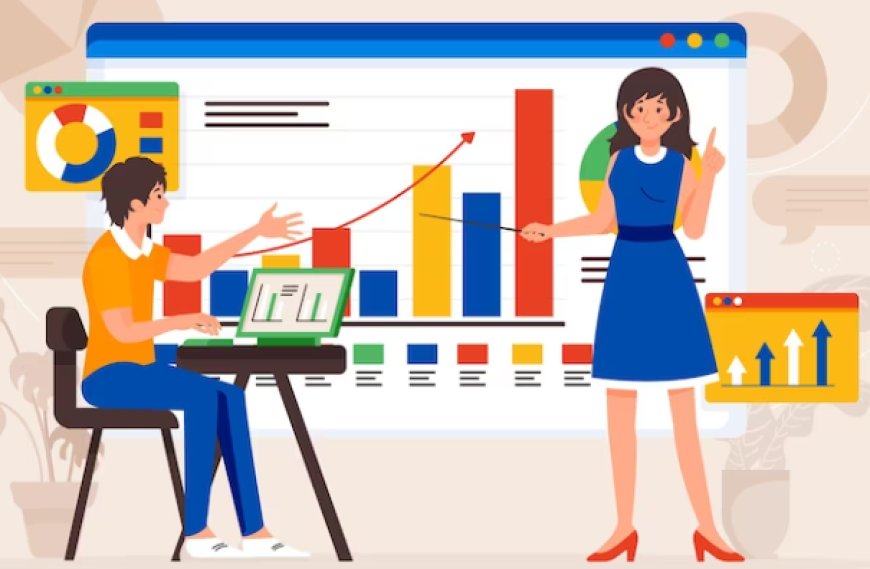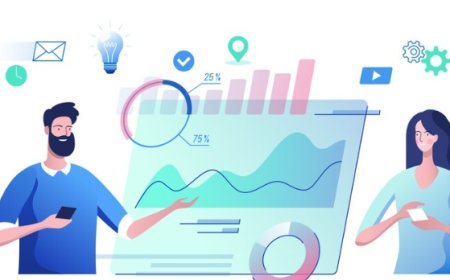Enhancing Your Skills in Business Analytics: A Comprehensive Guide
Explore data-driven strategies, tools, and techniques to make informed business decisions. Gain a competitive edge in today's dynamic business landscape

In today's data-driven world, honing your skills in business analytics is crucial for professional growth and success. As businesses increasingly rely on data to make informed decisions, professionals skilled in business analytics are in high demand. In this blog post, we will provide you with practical strategies and tips to improve your skills in business analytics, empowering you to excel in this dynamic field.
Continuous Learning and Education
Stay abreast of the latest trends, tools, and techniques in business analytics by engaging in continuous learning. Take advantage of online courses, webinars, tutorials, and workshops offered by reputable platforms and educational institutions. Platforms like Coursera, edX, and DataCamp offer a wide range of courses covering various aspects of business analytics. Invest time in exploring new concepts, acquiring new skills, and deepening your understanding of advanced analytical methods.
Hands-On Experience
Apply your skills in real-world scenarios by seeking opportunities to work on practical projects. Look for internships, freelance projects, or side gigs that allow you to gain hands-on experience in data analysis, modeling, or visualization. Real-world projects provide invaluable insights, expose you to diverse datasets and challenges, and enhance your problem-solving abilities.
Utilize Open-Source Tools
Take advantage of open-source tools and libraries widely used in the business analytics community. Familiarize yourself with programming languages such as Python or R, and leverage their extensive libraries, such as NumPy, Pandas, or ggplot2, for data manipulation, statistical analysis, and visualization. Open-source tools provide flexibility, access to the latest advancements, and a strong community for support and knowledge sharing.
-
Familiarize yourself with open-source programming languages such as Python or R.
-
Explore and leverage libraries and packages specific to business analytics, such as NumPy, Pandas, Scikit-learn, or ggplot2.
-
Take advantage of open-source data visualization tools like Matplotlib, Seaborn, or Plotly for creating interactive and visually appealing charts and graphs.
-
Utilize Jupyter Notebooks or RStudio, popular open-source environments, for data exploration, analysis, and model development.
-
Engage with open-source communities and forums to seek guidance, share knowledge, and collaborate with other professionals in the field.
-
Stay updated with the latest advancements and contributions to open-source projects by following blogs, GitHub repositories, and online communities.
-
Participate in hackathons, data challenges, or collaborative projects that utilize open-source tools to gain practical experience and expand your skill set.
-
Contribute to open-source projects by sharing your own code, reporting issues, or proposing enhancements, thereby enhancing your technical proficiency and establishing a strong online presence.
-
Take advantage of online tutorials, courses, and documentation available for open-source tools to deepen your understanding and proficiency in utilizing these resources effectively.
Networking and Collaboration
Connect with other professionals in the field of business analytics to expand your network and foster collaborative learning. Attend industry conferences, join professional forums and online communities, and participate in meetups or webinars. Engage in discussions, share knowledge, and seek advice from experienced practitioners. Collaborating with peers can expose you to different perspectives, practical insights, and new techniques.
Stay Curious and Solve Real Business Problems
Develop a curious mindset and seek opportunities to apply your skills to solve real business problems. Engage with colleagues, stakeholders, or industry professionals to understand their challenges and identify areas where analytics can make a meaningful impact. By aligning your analytical skills with practical business needs, you can develop actionable insights that drive tangible outcomes.
Sharpen Data Visualization Skills
Effective data visualization is a critical aspect of business analytics. Focus on enhancing your data visualization skills by studying best practices, exploring different visualization techniques, and experimenting with various tools such as Tableau, Power BI, or Python libraries like Matplotlib or Seaborn. Strive to create compelling and informative visualizations that convey complex information in a clear and visually appealing manner.
Embrace Analytical Thinking
Cultivate an analytical mindset characterized by critical thinking, logical reasoning, and problem-solving. Practice breaking down complex problems into smaller, manageable components, and approach them systematically. Develop an understanding of different analytical methodologies, statistical techniques, and machine learning algorithms. Apply these techniques to extract insights, detect patterns, and make data-driven decisions.
Communicate Effectively
Strong communication skills are crucial in business analytics. Enhance your ability to communicate complex analytical concepts and insights to non-technical stakeholders. Practice translating technical jargon into simple, relatable language, and focus on delivering clear and concise messages. Develop storytelling skills that allow you to present data-driven narratives that resonate with your audience.
-
Tailor your communication style and message based on the knowledge, background, and needs of your audience. Adapt your language and level of technicality accordingly.
-
Break down complex analytical concepts into digestible, easy-to-understand terms. Use analogies or relatable examples to make your points clear.
-
Visualize data and insights using charts, graphs, and diagrams to enhance understanding and engagement. Choose visual representations that effectively convey the message you want to communicate.
-
Organize your thoughts in a logical manner and create a clear narrative flow. Present information in a structured format, using headings, bullet points, or numbered lists to improve readability.
-
Communicate your key points succinctly and avoid unnecessary jargon or technical details. Focus on the most relevant information to keep your audience engaged.
-
Frame your analysis or insights in the form of a compelling narrative. Use storytelling techniques to captivate your audience and help them relate to the data and insights being presented.
-
When engaging in discussions or presentations, listen actively to others' perspectives and feedback. Respond thoughtfully and demonstrate a willingness to understand and address questions or concerns.
-
Encourage open and honest feedback from your audience to improve your communication skills. Actively listen to suggestions and areas for improvement, and use them to refine your future communication efforts.
-
Understand the nuances of communicating through various mediums, such as written reports, presentations, or virtual meetings. Adjust your style, tone, and visual aids accordingly to maximize impact.
-
Demonstrate confidence in your communication and convey your passion for the subject matter. Engage your audience through enthusiasm and genuine interest in the data and insights you are sharing.
-
Regularly practice your communication skills through presentations, discussions, or mock scenarios. Seek opportunities to refine your delivery, receive constructive feedback, and build confidence in your ability to effectively communicate in business analytics.
Seek Feedback and Continuous Improvement
Seek feedback from mentors, colleagues, or industry experts to gain insights into your strengths and areas for improvement. Actively seek constructive criticism and use it to refine your skills. Embrace a growth mindset and be open to continuous learning and improvement. Reflect on your projects, identify areas where you can enhance your skills, and strive to build upon your strengths.
Improving your skills in business analytics is a continuous journey that requires dedication, practice, and a commitment to lifelong learning. By following these strategies, you can enhance your analytical abilities, stay up-to-date with industry advancements, and position yourself for success in the ever-evolving field of business analytics. Remember, continuous improvement, practical application, and a passion for data-driven insights are key to unlocking your full potential in business analytics.











































